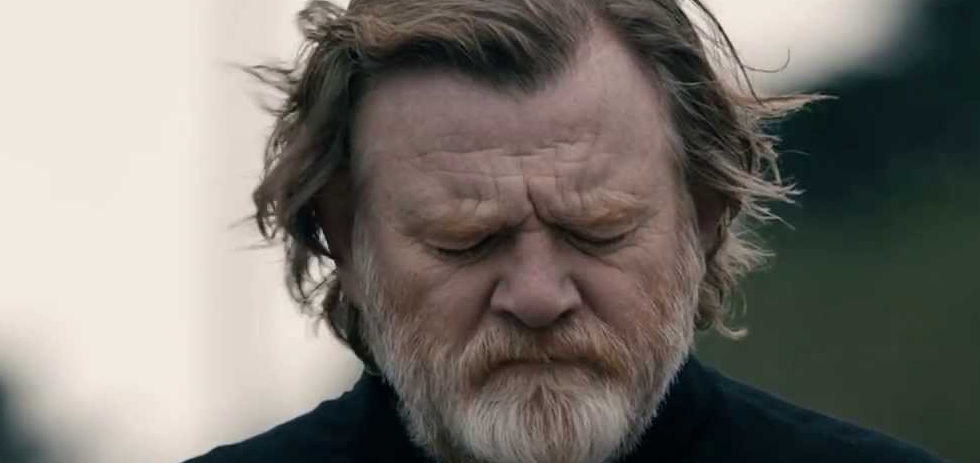
Calvary opens in the confessional. Father James Lavelle (Brendan Gleeson) listens meekly to an unseen victim, who reveals he had been sexually assaulted by a priest years previously. He promises to return a week later, to kill Father James. The title, Calvary, refers to the area outside Jerusalem where Christ was crucified. McDonagh’s country town in County Sligo becomes the site of a similar scapegoating.
With the narrative established, what follows is Lavelle’s attempts to order his affairs in what will be his last week. The film’s conclusion is all but assured by its opening, but this isn’t important. Calvary is not interested in plot but character, as McDonagh focusses on Lavelle’s interactions with his ministry. He’s a good priest, intellectual and empathetic, but subversive. An ex-alcoholic, he has a daughter, and—previously—a wife. Her passing allows him to take up the vocation. In the town, he’s revered for his manner but targeted, maliciously, by the people he’s closest to. In this way, the parish priest becomes testing ground for a very 21st century kind of antitheism. He’s insulted by atheist doctors, insecure bankers, and adulterers. What’s more, he’s blamed for the church’s colonial past, child sex abuse, and his parishioners’ loss of faith. For the most part, Lavelle turns the cheek, a veritable cheek-turning machine, continuing to offer support even while they spit and piss on him.
McDonagh’s comic timing is faultless, he manages to find infectious laughter in a bleak and irreverent subject matter. The film’s opening line—which I considered spoiling but won’t for the sake of its punch—makes light of the lightless, and, in my case, had me laughing. I have to emphasise, not everyone will see the film this way. It’s serious black comedy, the kind that puts a gun to your head and tells you to laugh or cry. At its Australian premiere at Sydney Film Festival, the opening was met with both rapturous laughter and the mild footsteps of attendees who—two minutes in—had had enough.
Visually, McDonagh focusses on points of intersection in the community—the church and the pub—and frames his characters with novelty, almost refusing orthodox shots on principle. There’s a beauty in the greens of bucolic Ireland, the pastel creams of the town, and the blues of the sky and water. There’s a balance of colour, everything against the omnipresent Irish surf. Particularly memorable is the way Lavelle’s cossack makes him seem like an apparition amidst the wind and salt.
McDonagh entertains a large cast, and he segues between them without mind for resolution. He might be criticised for his lack of focus, or for narrative threads that go unresolved, but how could they be? With only a week to get his house in order, Lavelle can only gesture at solutions, leaving their implementation to the individuals. In this way, the film is like a reverse-It’s A Wonderful Life. We see that the community totters along, perhaps only, because Father Lavelle was born, and wonder how they expect to proceed without him.
McDonagh’s characters display both a hard-earned cynicism and an awareness of narrative convention, though where such awareness only detracted from brother Martin’s Seven Psychopaths, Calvary triumphs through a street-smart sincerity. Gleeson’s performance is masterful, a balance of the charged Irish wit he displayed in The Guard and In Bruges with a kind of understated empathy, a sadness that finds voice not in words but in the mileage he displays on his face. There’s a segment where Lavelle, walking to the beach, encounters a young girl. They converse warmly—as he does with his daughter—but any rapport is undermined when her father pulls into the frame. The father barks a stereotypical suspicion about the priesthood, and Lavelle, patently aware of how his once-respected vocation has been denigrated by evil people, openly weeps.
People might read this film as an injunction against the Catholic Church, but they would do so myopically. The Church is simply an emblem for all of Ireland’s institutions, alluded to in lengthy discussions on the banking sector and the army. In this way, the film’s core is not anti-church, but anti-establishment. It permits the existence of good priests (and bad ones), of good people (and bad ones), and suggests that while we might have cause for cynicism about our institutions, we should still entertain some optimism about the individuals within them.
You can read our interview with writer/director John Michael McDonagh here.
Around the Staff:
| Virat Nehru | |
| Dominic Barlow | |
| Conor Bateman | |
| Felix Hubble |
